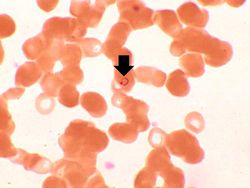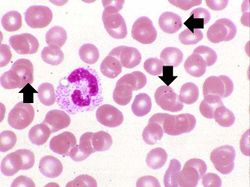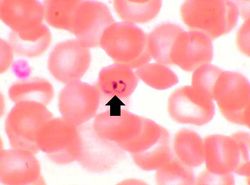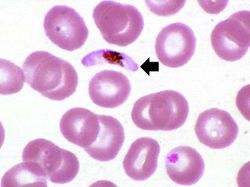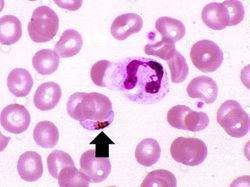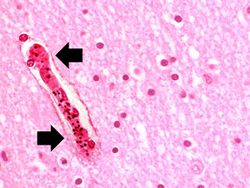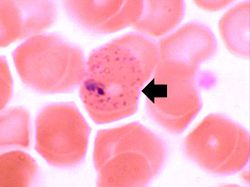Difference between revisions of "IPLab:Lab 11:Malaria"
Seung Park (talk | contribs) |
Seung Park (talk | contribs) |
||
| Line 17: | Line 17: | ||
* <spoiler text="What was the possible mechanism for the dysentery that developed in this patient?">Parasitized red blood cells cause obstruction of small blood vessels in the bowel leading to bowel ischemia. Another possible cause for dysentery in someone just back from a third world country would be intestinal parasites, such as Giardia, Entamoeba, or helminths.</spoiler> | * <spoiler text="What was the possible mechanism for the dysentery that developed in this patient?">Parasitized red blood cells cause obstruction of small blood vessels in the bowel leading to bowel ischemia. Another possible cause for dysentery in someone just back from a third world country would be intestinal parasites, such as Giardia, Entamoeba, or helminths.</spoiler> | ||
* <spoiler text="What was the probable cause of the patient's altered mental status?">Patients with very high fever can develop altered metal status, but in this case the likely cause would be malignant cerebral malaria. Parasitized RBCs block small blood vessels in the brain leading to multifocal areas of hypoxia.</spoiler> | * <spoiler text="What was the probable cause of the patient's altered mental status?">Patients with very high fever can develop altered metal status, but in this case the likely cause would be malignant cerebral malaria. Parasitized RBCs block small blood vessels in the brain leading to multifocal areas of hypoxia.</spoiler> | ||
| + | |||
| + | == Additional Resources == | ||
| + | === Reference === | ||
| + | |||
| + | |||
| + | === Journal Articles === | ||
| + | |||
| + | |||
| + | === Images === | ||
| + | |||
| + | |||
| + | == Related IPLab Cases == | ||
| + | |||
{{IPLab 11}} | {{IPLab 11}} | ||
[[Category: IPLab:Lab 11]] | [[Category: IPLab:Lab 11]] | ||
Revision as of 04:25, 23 August 2013
Contents
Clinical Summary
This 46-year-old forestry consultant presented with a seven-day history of mild abdominal cramping, diarrhea, mild myalgias, gradually worsening headache, and subjective fever. The patient had recently returned from spending 5 months in the Thailand rainforests as a consultant to lumber companies. Stool cultures and repeated stool examinations for ova and parasites were negative. A presumptive diagnosis of viral gastroenteritis was made. Three days later the patient returned with a fever of 103° and bloody diarrhea. On examination the patient appeared acutely ill and had orthostatic hypotension. Exam was otherwise unremarkable. The patient was admitted and intravenous rehydration and broad-spectrum IV antibiotics were begun. Over the next eight hours the patient became progressively lethargic and finally became unresponsive to speech. His temperature rose to 106°. Careful examination of a peripheral blood smear revealed P. falciparum with a parasitemia of 5%. Intravenous antimalarial drugs were administered and over the next three days the patient's clinical condition gradually improved. Repeat peripheral smears at 3, 7, 14, and 28 days were negative for malaria.
Images
Study Questions
Additional Resources
Reference
Journal Articles
Images
Related IPLab Cases
| |||||
